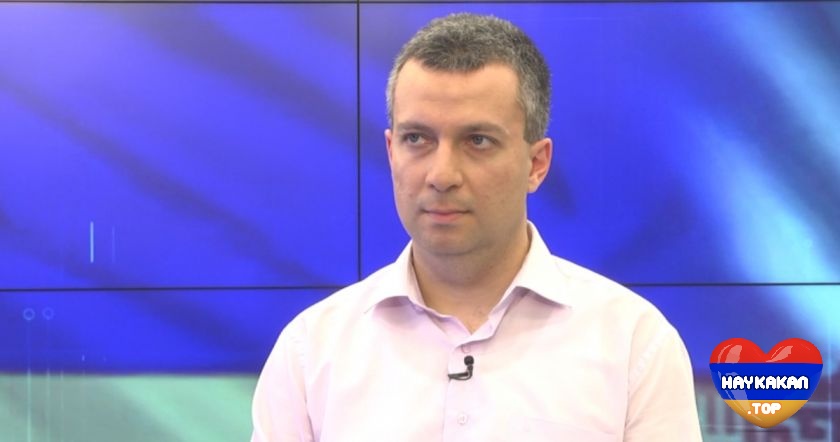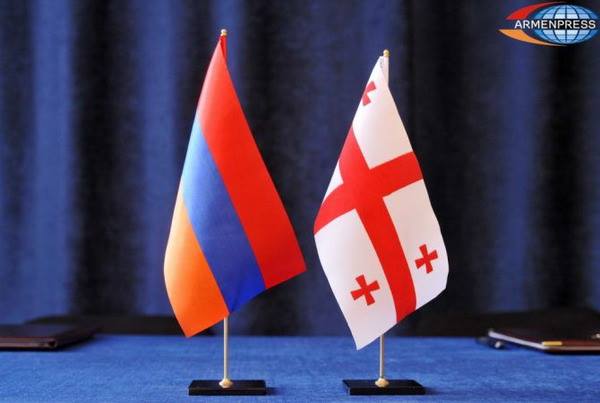Armenia and Georgia have a long history of relations. In more recent times both republics were part of the Soviet Union and after collapse of the latter two states have found themselves involved in the regional geopolitics of the South Caucasus. Each of them chose its own foreign policy priorities based on relevant perceptions of vital national interests. Armenia, being under joint Azerbaijani – Turkish pressure due to the Karabakh conflict and with memories of 1915 Armenian Genocide still fresh has no alternative but to establish political-military alliance with Russia. Georgia, with historical grievances over the Russia’s role of demolishing Georgian independent statehood and more fresh memories of April 1989 tragic events in downtown Tbilisi, chose the path towards Euro-Atlantic integration.
The conflicts in Karabakh, South Ossetia and Abkhazia also put Armenia and Georgia in different camps. Tbilisi rejects the right of people’s self determination as a legitimate tool to move towards secession and urges on restoration of its territorial integrity. Thus Georgia categorically declines the possibility to recognize the independence of Abkhazia and South Ossetia, instead offering a high level autonomy within Georgia as the only acceptable solution for the conflicts there. Meanwhile, Armenia supports independence of Nagorno Karabakh, rejecting any possibility of return of Karabakh under the Azerbaijani jurisdiction. Of course, both Armenia and Georgia are stating that each conflict in South Caucasus has its unique history and solutions to them also should be unique. However, beneath the surface there is a rooted perception that in this context Armenia’s and Georgia’s strategic interests at least are not the same.
The Georgian strategic partnership with Azerbaijan and Turkey, growing economic influence of both Baku and Ankara, and the use of Georgian territory for the realization of regional projects circumventing Armenia (Baku – Tbilisi – Jeyhan oil and Baku – Tbilisi – Erzurum gas pipelines, Baku –Tbilisi – Kars railway), also do not make Armenia happy. The same could be said to the Armenia – Russia strategic alliance and the deployment of Russian military base in Gyumri from Georgian perspective. Some Georgian experts do not exclude the hypothetical possibility of Russia using its military base in Gyumri against Georgia. Armenia rejects and will continue to reject even theoretical possibilities of such development, but this will not completely calm down Georgian concerns.
Meanwhile, the shared history is not only source for developing friendly relations. The problems related with the fate of Armenian churches in Georgia, as well as Georgian policy towards Armenian minority are issues actively debated in large sectors of Armenian society. Some perceive the growing decline of Armenian population in Georgia as a result of some sort of deliberate Georgian policy. The discussions during Soviet period in Armenia regarding the Soviet Georgia’s policy on forced changes of Armenian surnames into Georgians as the only way to have a career success also have ignited contradictory feelings. This issue is not discussed publicly in interstate level, and many understand that the large scale immigration of Armenians from Georgia is also the result of the steep decline of socio-economic conditions there. However, in conscious of many Armenians there are lingering doubts regarding the true intentions of Georgian authorities.
Meanwhile, some Georgians perceive the mainly Armenian populated areas of Samtskhe Javaklheti region of Georgia as a potential source of instability. The negative attitude of Armenians of Akhalqalaki towards the Georgian efforts to move out Russian military base deployed there has not contributed to the positive feelings among Georgians. We also have to take into consideration that both Russia and Azerbaijan are willing to use possible sources of disagreements to deteriorate the relations between Armenia and Georgia. Azerbaijan simply wants to isolate Armenia as much as possible. Thus, Azerbaijani media and expert community is actively circulating the ideas of separatist movements in Javakheti, attempting to depict Armenia as a regional spoiler. As for Russia, Moscow supports the dissemination of perceptions on growing Turkish and Azerbaijani influence in Georgia, as well as rumors on possible deployment of Turkish military bases in Armenian populated areas of Georgia in case of Tbilisi’s membership into the NATO. Thus, Moscow wants to create a strong anti NATO bulwark within Armenian minority of Georgia.
However, despite all above mentioned beneath the surface problems, two states have mainly managed to develop friendly relations. Georgia serves as the main corridor for Armenia to be connected with the world. Despite its strategic alliance with Russia, Armenia has not recognized the independence of Abkhazia and South Ossetia, and former Armenian President Serzh Sargsyan even has bestowed the Medal of Honor, Armenia’s highest award for foreign dignitaries, upon former Georgian President Mikheil Saakashvili in June 2009, less than a year after the Georgia – Russia war.
The change of government in Georgia in 2012-2013 and the relative improvement of Russia – Georgia relations, especially in economic field presumably have created more favorable conditions for the further development of bilateral relations. Armenia and Georgia, alongside with Iran, Greece and Bulgaria has launched in 2016 the negotiations to establish “Persian Gulf – Black Sea” multimodal transport corridor which, if implemented could seriously undermine Azerbaijan’s and Turkey’s joint efforts to strangle Armenia economically. In the April of the same year, Armenia, Iran, Georgia and Russia signed a Memorandum of understanding on establishment of energy corridor. Through the EU support, all three border crossings between Armenia and Georgia (Bagratashen, Bavra and Gogavan) have been renovated and in December 2014 the agreement was signed to construct the second “Friendship Bridge” in Bagratashen which will become operational in 2020.
Relations after the “Velvet Revolution”
The “Velvet Revolution” of 2018 created some base for changes in bilateral relations. The new authorities of Armenia have declared the “Sovereignty” as the key pillar of foreign policy. There are no direct mentions about Russia, but given the Armenia’s undisputable overdependence on Moscow, the “Sovereignty” in foreign policy is perceived as a veiled message to Moscow that relations could not be the same. This may alleviate some of Georgia’s concerns regarding the possibilities of Moscow to use Armenia as a launch pad for any anti-Georgian activities. Armenia’s June 2019 abstention from voting on a UN resolution calling for the return of IDPs to Abkhazia and South Ossetia for the first time since 2008, (Yerevan had previously always voted against the resolution in the annual votes at the UN General Assembly) was perceived as a harbinger for positive changes in bilateral relations. The Yerevan’s attempts to have more independent policy on Georgia will definitely please both Georgian society and authorities. The apparent personal chemistry between Armenian and Georgian Prime Ministers, (they had two unofficial meetings in January and March 2019) also contributed to the improvement of the atmosphere.
Meanwhile, the some discussions within Armenian new authorities about the need to explore former Georgian President Saakahsvili’s reforms and adapt them to Armenia as a successful model of fighting against corruption and restoration of rule of law and democracy, may create some freeze in relations, given the current Georgian Government’s harsh criticism of Saakahsvili and ongoing tough political struggle between UNM and Georgian Dream, which was once more proved during the 2018 Georgian Presidential elections.
Another interesting aspect of “Velvet revolution” is the possibility of gradual change of spots as a “Beacon of democracy” in the post soviet space between Armenia and Georgia. Given the recent controversies in Georgia regarding the free speech as well as politically motivated use of justice (the dismissal of some journalists from Rustavi 2 TV after the change of the ownership, criminal charges against the father of the owner of the TV Pirveli, as well as against former board chair of the TBC Bank), many civil society organizations, including such significant Western players as Transparency International Georgia, are arguing that there is an obvious strengthening trend of informal governance and state capture, which entails concentration of considerable power in the hands of the ruling party and influential persons.
In this context the free and fair Parliamentary elections held in Armenia in December 2018 and absence of any public high level scandals involving key members of the new authorities could strengthen Armenia’s position as a more democratic state within EU and international civil society community.
However, the key geopolitical drivers influencing Armenia – Georgia relations remain in place. Armenia will continue its strategic alliance with Russia, and besides the vote on Georgia, the new Armenian authorities as for now have done nothing which may annoy Russia. They even agreed to Russian suggestion on sending humanitarian mission to Syria, presumably rejected by the former President Sargsyan. Meanwhile, despite Georgian authorities alleged intentions to improve relations with Russia, the June 2019 events in Tbilisi have proved that majority of Georgian society has anti-Russian feelings which can’t be changed as far as Russia has not repealed its recognition of Abkhazian and South Ossetian independence and has not relocated its military bases from there.
Georgia will continue to perceive Azerbaijan and Turkey as much more significant partners than Armenia, and given the very little possibility of any improvements in Armenia – Azerbaijan or Armenia – Turkey relations, this will continue to create beneath the surface tensions among Armenian society.
The reliable path towards real improvement of bilateral relations is not the attempts to ignore problems deeply rooted among both societies’ perceptions, but to start genuine dialogue to discuss them. As the first step, the wide range and institutionalized dialogue between experts and civil society community (based on the models of Visegrad Platform for Dialogue, EU – Russia civil society forum and other initiatives) should be launched. It may start to cover all problematic issues, such as Georgian authorities policy towards Armenian minority and the fate of Armenian churches in Georgia as well Georgian claims over the ownership of some churches in Lori province of Armenia. The candid discussions on the regional geopolitics and the both states perceptions on threats, challenges, opportunities as well as their vision for the region’s future should be essential part of such dialogue.

Dr. Benyamin Poghosyan, Executive Director, Political Science Association of Armenia; Founder and Chairman, Center for Political and Economic Strategic Studies





